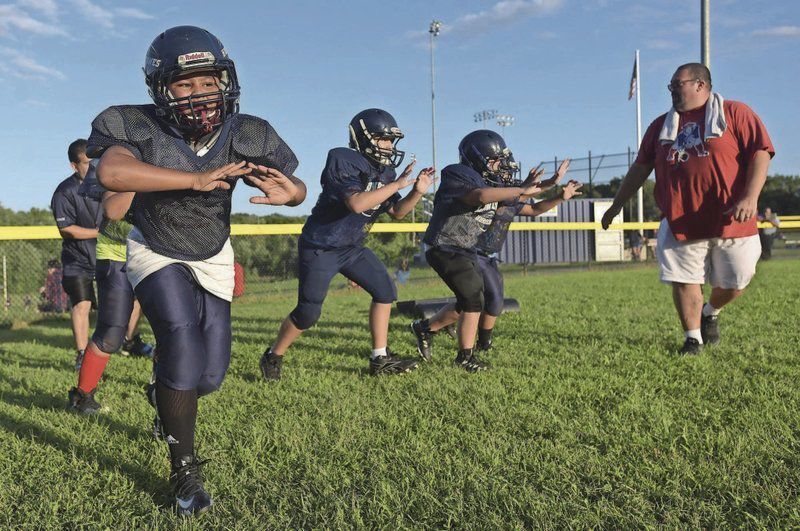Ban on tackle football meets backlash
Published 11:30 pm Thursday, February 28, 2019

- (TIM JEAN/Eagle-Tribune file photo) Coaches Dan Mackland-Rivera, right, and Ozzie Diaz, back left, work on blocking drills during Lawrence Pop Warner football practice. A bill before the Massachusetts Legislature would ban tackle football for those in seventh grade or below.
BOSTON — Pulling on pads and a football helmet is a rite of passage in many communities across the Unites States. Among youth, football remains one of the most popular sports, not far behind baseball, basketball and soccer.
But it continues to take licks for being among the most dangerous, despite years of improvements to training, equipment and techniques — so much that Massachusetts is weighing a ban on tackle football for elementary and middle school kids.
A controversial bill in the state Legislature would prohibit tackle football through seventh grade, and fine schools and sports leagues $2,000 for each violation. Kids would still be allowed to play flag or touch football, and high school tackle football would still be allowed.
Supporters of the bill point to research that shows repeated head impacts are more harmful to younger players than once thought.
“The trauma does not need to escalate to the point of a concussion to be harmful to children,” said state Rep. Paul Schmid, D-Westport, one of two lawmakers who proposed the bill.
But coaches, parents and players sharply object.
Chris Morales, coach and president of Lawrence Pop Warner, said he was “mortified” when he heard about the bill. He has coached youth and high school football, he said, “and my biggest concern is teaching proper tackling as early as possible.”
“To have a kid put on the pads for the first time in eighth grade and learn how to hit for the first time could cause a lot of injuries,” he said. “Some kids are like men in eighth grade, and others haven’t hit puberty. And then kids don’t know the proper mechanics.
“I believe you are putting kids in danger,” he said. “I am against this, big-time.”
Chris Nowinski, co-founder and CEO of the Boston-based Concussion Legacy Foundation, said the state should act to protect children.
He points to research showing players who begin tackling before age 12 have higher rates of depression, anxiety and memory loss.
“The brain was never meant to get hit in the head thousands of times over your life, and it causes serious, long-term problems for players,” he said. “Children’s brains are rapidly developing, especially between between the ages of 8 and 13, and I don’t think anyone would say its a good time for them to get hit in the head and suffer a brain injury.”
The bill makes Massachusetts one of a handful of states — with New York, California, Maryland and New Jersey — to weigh such a restriction. To date, none has actually banned youth tackle football.
Resistance to the proposal is stiff. An online petition calls on Gov. Charlie Baker to reject the ban. It had gathered nearly 5,000 signatures as of Tuesday.
Petitioners cited “advancements youth football makes each year in the areas of safety, coaches training, new equipment, styles of play, and rule changes.”
“This is really sad to me, as someone who has played this game since I was 6 years old,” wrote New England Patriots offensive lineman David Andrews on Twitter. “I understand people’s concerns with children playing and I respect that. But let parents and kids decide if they want to play or not.”
Brian St. Pierre, football coach at the private St. John’s Prep in Danvers, said such a law could have unintended effects because players wouldn’t be given enough time to learn how to tackle safely.
“It’s very dangerous to think of young boys who wind up wanting to play football, and they have no background in the proper way of tackling,” he said. “In an effort to make it safer, I think they’re making it more dangerous by implementing things like this.”
St. Pierre, who played quarterback at St. John’s Prep, Boston College and in the NFL, said coaches work on safe tackling from the first day of practice.
“We preach it, we teach it, we film it and show the boys the right way, where we want your body positioned,” he said. “There’s a lot of coaches taking the right steps to do it the right way.”
Decisions about tackle football should be left to parents, he added.
“Obviously I’m biased, but football is the greatest game,” he said. “To have the government involved in something like this, it’s a sad day.”
Christian M. Wade covers the Massachusetts Statehouse for CNHI’s newspapers and websites. Reach him at cwade@cnhi.com. Staff writers Paul Leighton and Bill Burt contributed to this story.





